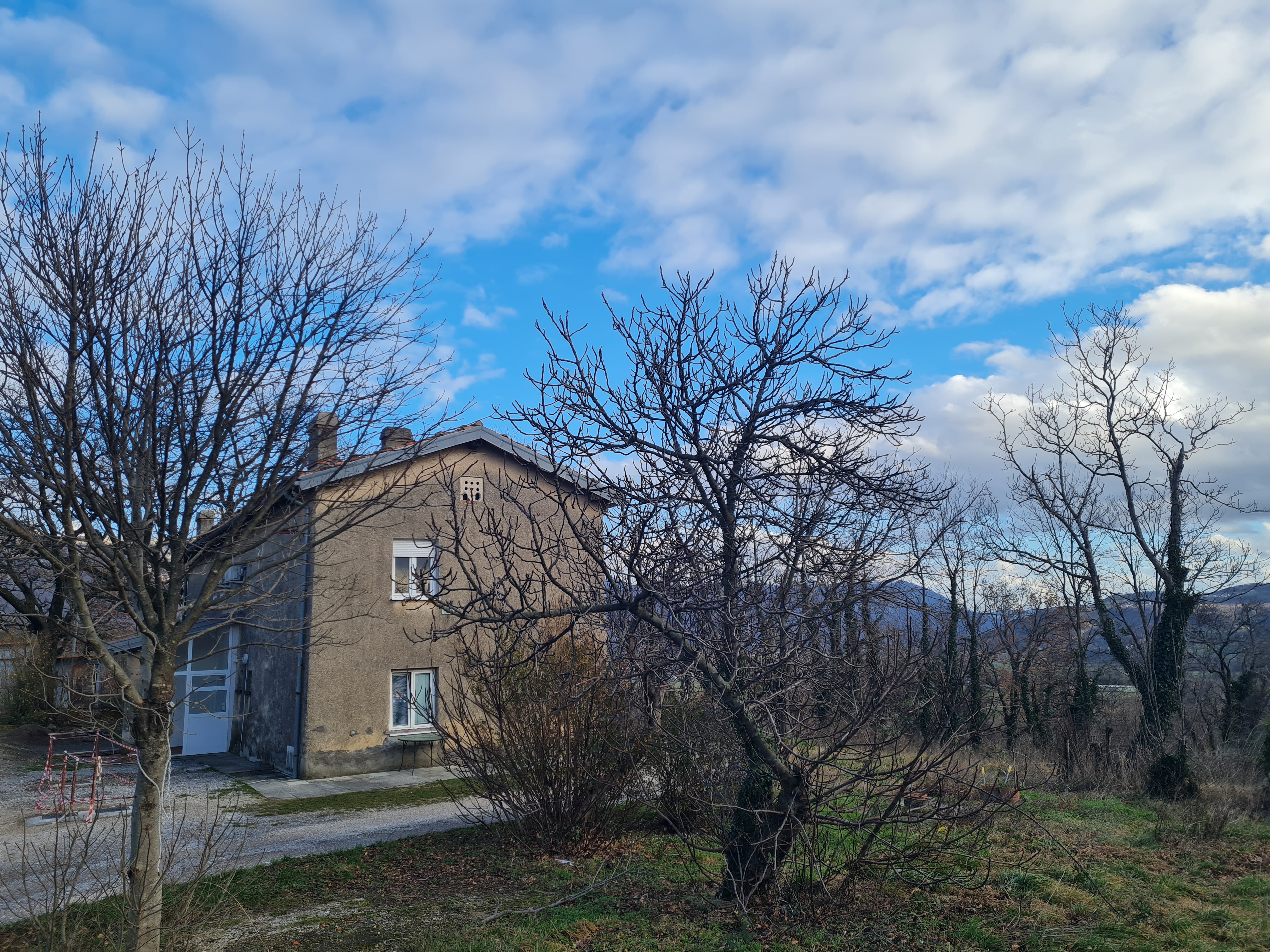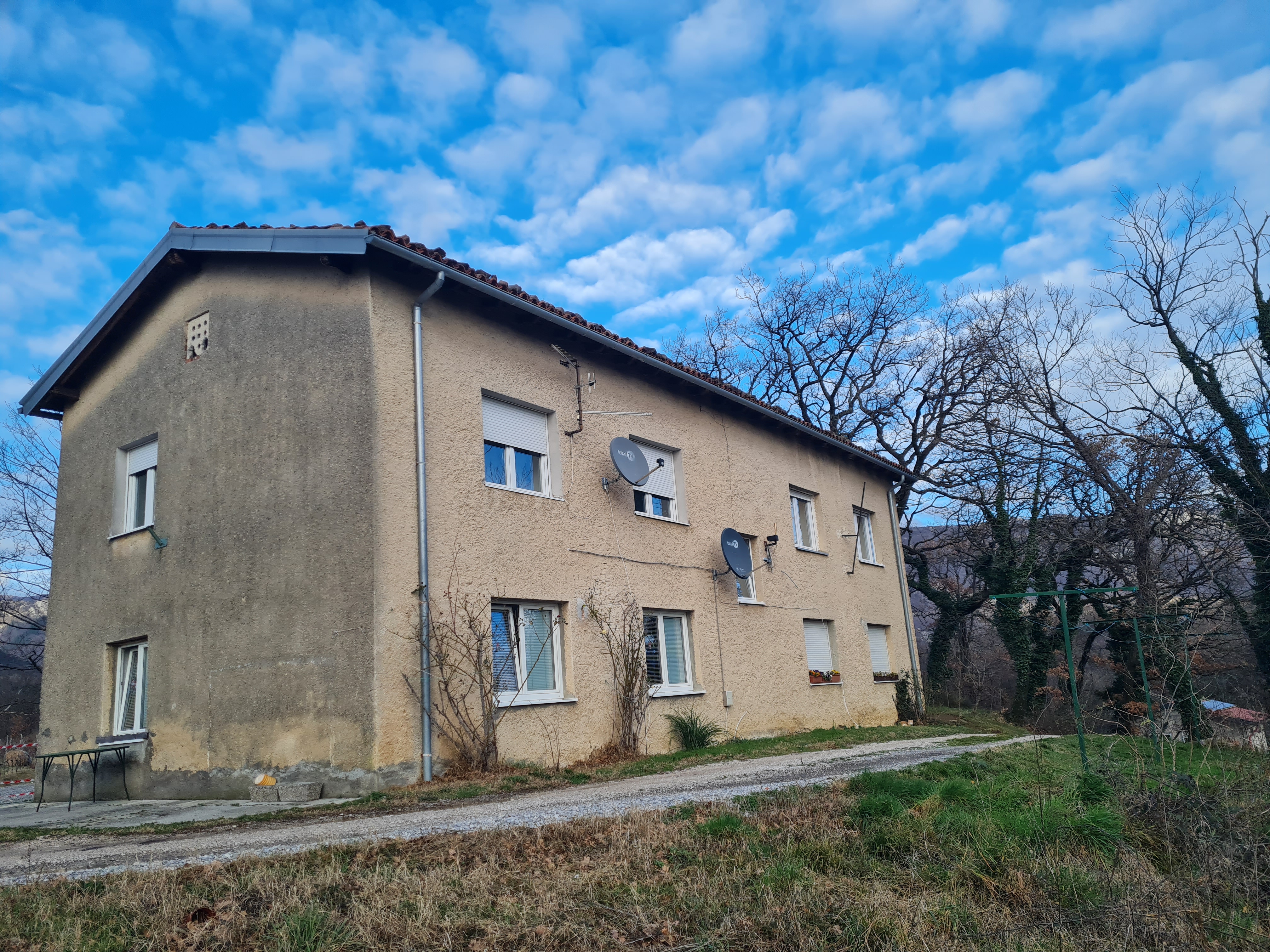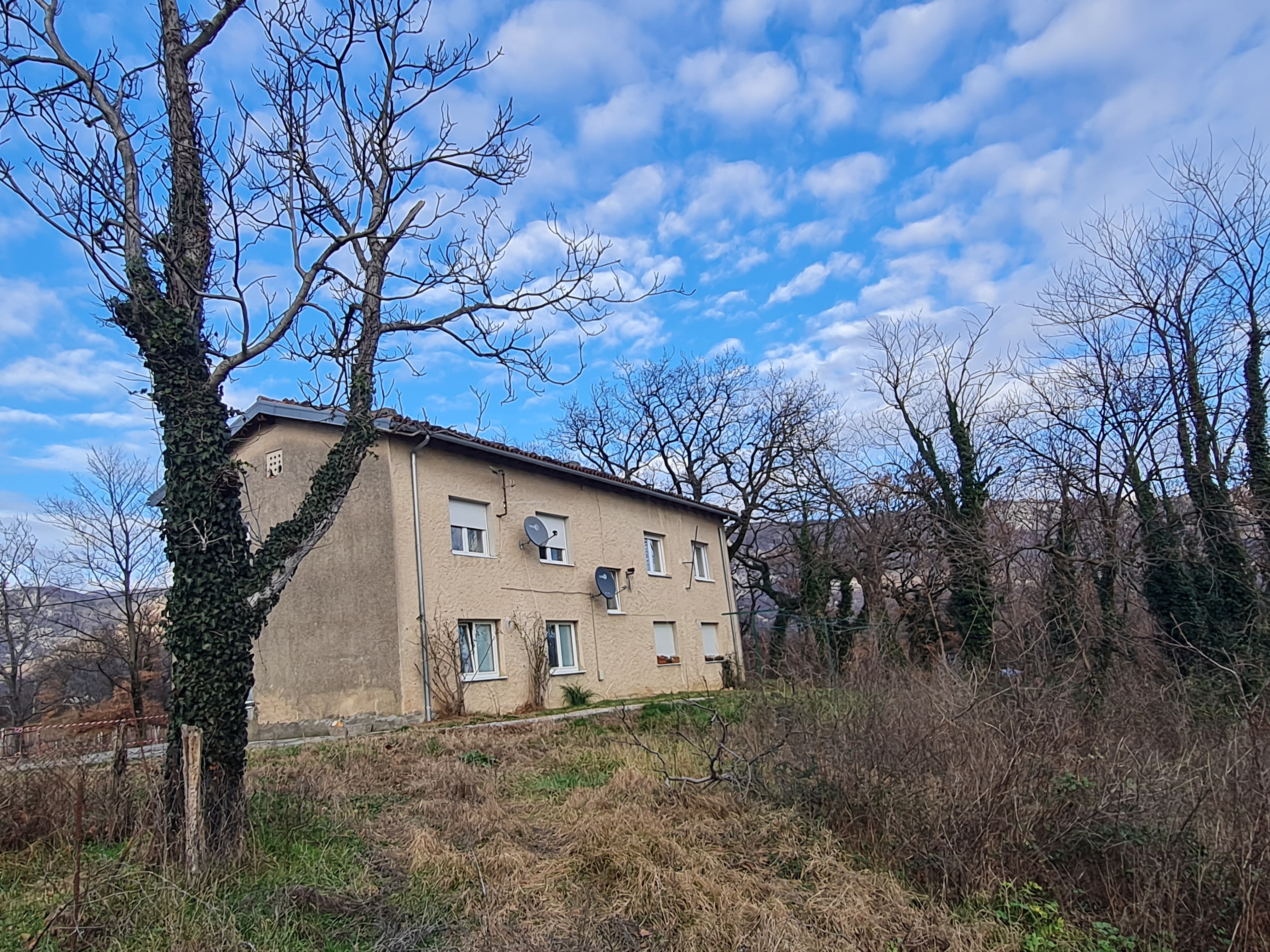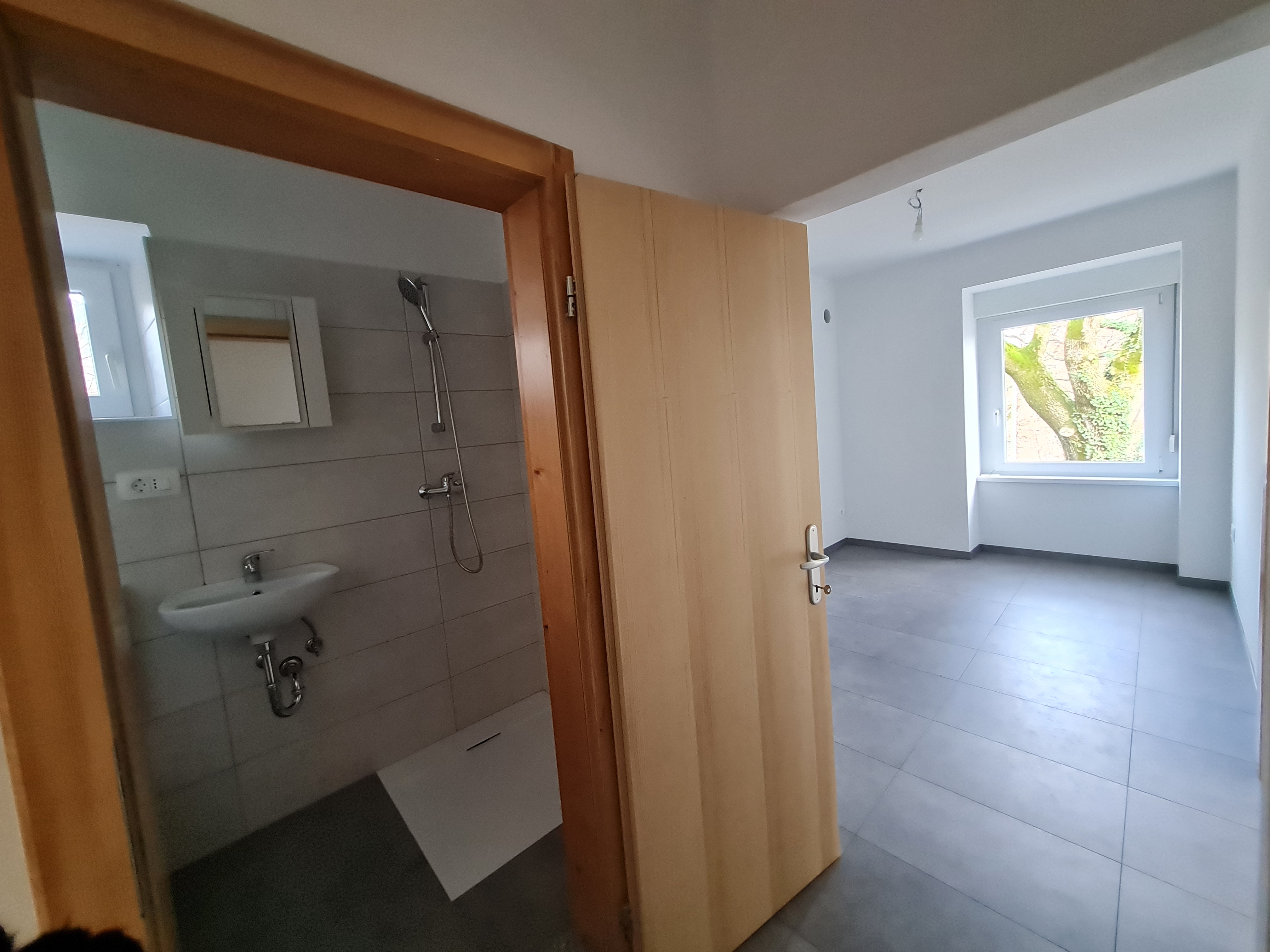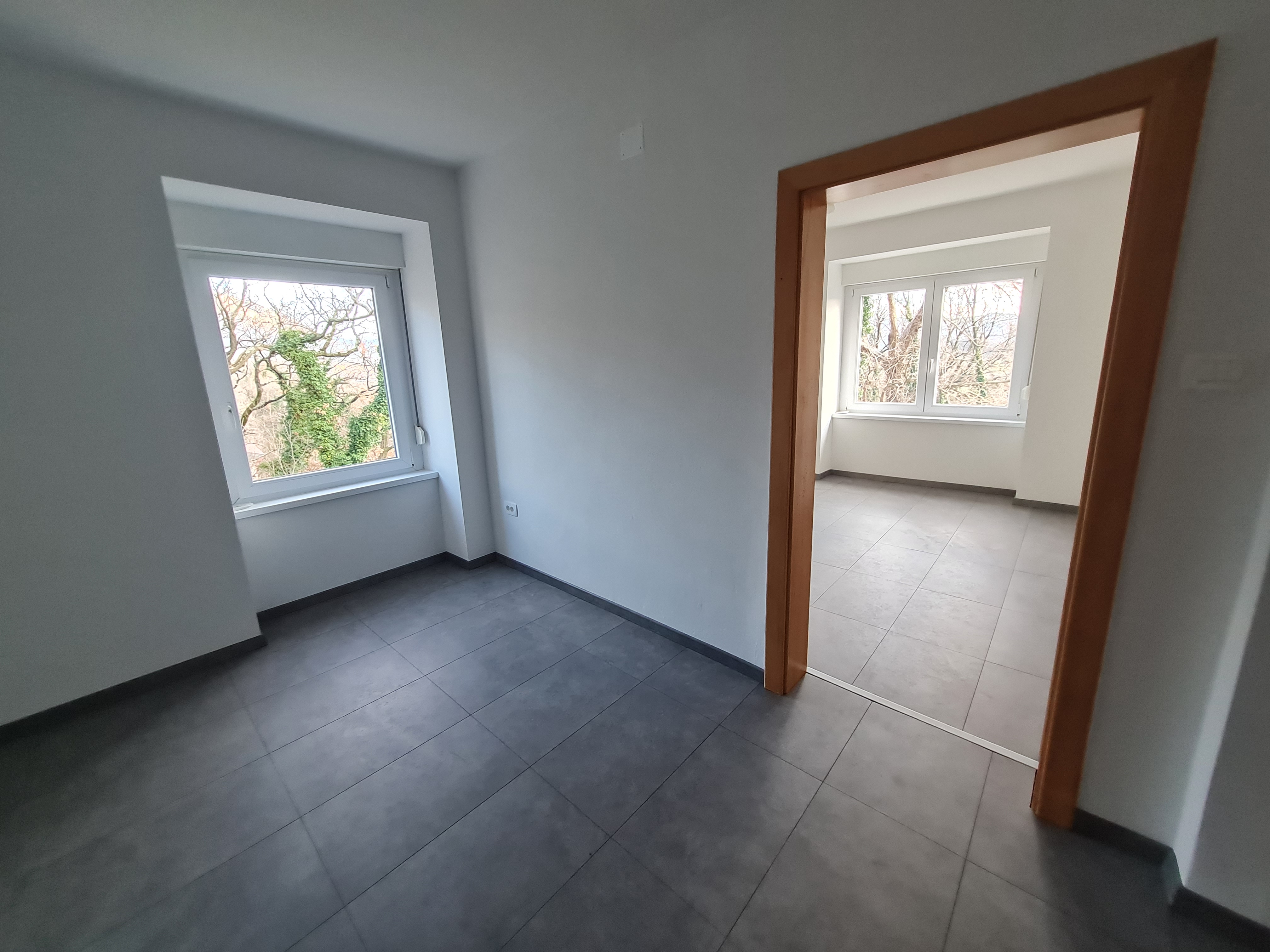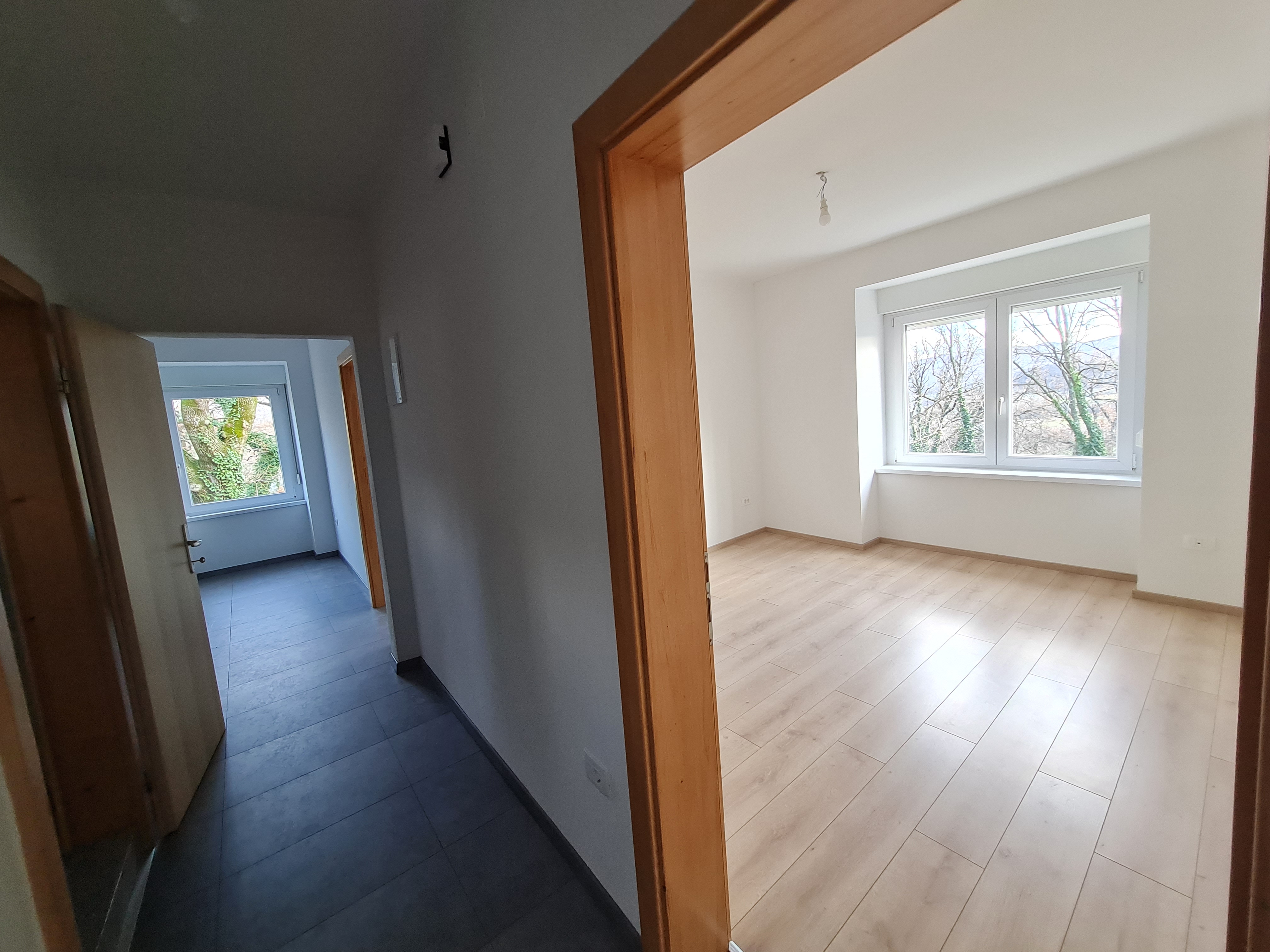From property to home
/
Vacant properties in Ajdovščina are getting a fresh start! This initiative breathes new life into empty spaces, transforming them into modern, sustainable homes. By revitalizing these properties, Ajdovščina is creating a vibrant community with alternative housing options, preserving its charm while embracing the future. A greener, more connected municipality is taking shape.
Slovenia
Lokavec 74, 5270 Ajdovščina
and
Selo 39, 5262 Črniče
and
Selo 39, 5262 Črniče
Prototype level
Yes
Yes
Yes
No
No
001: Ajdovščina (SI)
Summary:
Ajdovščina faces a growing challenge of vacant properties, especially in rural areas. Despite rising demand for affordable housing, many homes remain empty due to economic and demographic shifts. As part of the "From property to home" initiative, we identified over 600 vacant properties with the help of the Statistical Office of Slovenia, aiming to revitalize them for vulnerable groups. The first renovation, in Lokavec village, has been completed as a pilot project.
Overall Aim:
Our goal is to reintegrate vacant properties into the community, addressing local housing needs, supporting rural revitalization, and promoting sustainable development. We aim to repurpose vacant homes for residential use, improve housing accessibility, and foster community-driven development.
Target Groups:
Youth
Young professionals
Families seeking affordable housing
Vulnerable groups (low-income individuals, elderly)
Local property owners with unused properties
General public benefiting from sustainable development
Specific Objectives:
Activate and renovate vacant properties for various target groups.
Improve housing access for vulnerable populations (youth, young families, elderly) and those seeking affordable housing.
Develop energy-efficient, sustainable properties.
Strengthen rural life by incorporating gardens and green spaces cultivated by residents.
Expected Outcomes:
Activation and renovation of at least five vacant properties for residential use.
Creation of a catalogue of vacant properties in Ajdovščina for transparency.
Development of legal frameworks for a public rental service, allowing the Municipality’s Public Housing Fund to rent properties from private owners.
Public presentation of the "From property to home" initiative.
Preparation of a public tender.
Ajdovščina faces a growing challenge of vacant properties, especially in rural areas. Despite rising demand for affordable housing, many homes remain empty due to economic and demographic shifts. As part of the "From property to home" initiative, we identified over 600 vacant properties with the help of the Statistical Office of Slovenia, aiming to revitalize them for vulnerable groups. The first renovation, in Lokavec village, has been completed as a pilot project.
Overall Aim:
Our goal is to reintegrate vacant properties into the community, addressing local housing needs, supporting rural revitalization, and promoting sustainable development. We aim to repurpose vacant homes for residential use, improve housing accessibility, and foster community-driven development.
Target Groups:
Youth
Young professionals
Families seeking affordable housing
Vulnerable groups (low-income individuals, elderly)
Local property owners with unused properties
General public benefiting from sustainable development
Specific Objectives:
Activate and renovate vacant properties for various target groups.
Improve housing access for vulnerable populations (youth, young families, elderly) and those seeking affordable housing.
Develop energy-efficient, sustainable properties.
Strengthen rural life by incorporating gardens and green spaces cultivated by residents.
Expected Outcomes:
Activation and renovation of at least five vacant properties for residential use.
Creation of a catalogue of vacant properties in Ajdovščina for transparency.
Development of legal frameworks for a public rental service, allowing the Municipality’s Public Housing Fund to rent properties from private owners.
Public presentation of the "From property to home" initiative.
Preparation of a public tender.
Ajdovščina
Housing
Sustainability
Community
Revitalisation
Key Objectives
The "From Property to Home" initiative enhances sustainability by repurposing vacant buildings into energy-efficient homes. It reduces environmental impact, promotes self-sufficiency, and fosters a greener, healthier lifestyle for residents.
Ambition I: To Repurpose
Renovating old buildings instead of demolishing them minimizes construction waste and preserves architectural heritage. The use of modern insulation and locally sourced wood reduces heating energy consumption. In Lokavec, the first renovated property retained its wooden roof structure and floors, with local craftsmen producing wooden joinery (main and inner doors) to ensure sustainability and authenticity.
Ambition II: To Regenerate
Each home includes a garden, enabling tenants to grow vegetables and reduce packaging waste. Organic waste from gardening is repurposed as fertilizer, supporting environmental regeneration. Gardening also fosters well-being, promoting mental health and self-sufficiency by allowing tenants to cultivate their own food.
An Exemplary Model
The "From Property to Home" initiative demonstrates how vacant spaces can be transformed into sustainable, inclusive, and environmentally friendly living environments. Ajdovščina sets an example for municipalities seeking holistic, community-driven urban and rural renewal strategies, aligning with New European Bauhaus values.
The "From Property to Home" initiative enhances sustainability by repurposing vacant buildings into energy-efficient homes. It reduces environmental impact, promotes self-sufficiency, and fosters a greener, healthier lifestyle for residents.
Ambition I: To Repurpose
Renovating old buildings instead of demolishing them minimizes construction waste and preserves architectural heritage. The use of modern insulation and locally sourced wood reduces heating energy consumption. In Lokavec, the first renovated property retained its wooden roof structure and floors, with local craftsmen producing wooden joinery (main and inner doors) to ensure sustainability and authenticity.
Ambition II: To Regenerate
Each home includes a garden, enabling tenants to grow vegetables and reduce packaging waste. Organic waste from gardening is repurposed as fertilizer, supporting environmental regeneration. Gardening also fosters well-being, promoting mental health and self-sufficiency by allowing tenants to cultivate their own food.
An Exemplary Model
The "From Property to Home" initiative demonstrates how vacant spaces can be transformed into sustainable, inclusive, and environmentally friendly living environments. Ajdovščina sets an example for municipalities seeking holistic, community-driven urban and rural renewal strategies, aligning with New European Bauhaus values.
Key Objectives
The "From Property to Home" initiative enhances aesthetics and quality of life by repurposing vacant buildings into comfortable, sustainable homes. It preserves cultural heritage, fosters community connections, and improves well-being through thoughtful design and accessibility.
Ambition I: To Activate
Renovated homes prioritize comfort, natural lighting, and inviting spaces while maintaining Ajdovščina's historical character. Local craftsmen and designers ensure authenticity, merging tradition with modern needs. Thick walls in older buildings provide superior insulation, enhancing residents' experience.
Ambition II: To Connect
Community gardens serve as key social hubs, fostering knowledge exchange between generations. Young tenants learn gardening from experienced residents, while older individuals gain new insights. This initiative revitalizes empty houses and strengthens neighbourhood identity and pride.
Ambition III: To Integrate
The project encourages a healthier lifestyle by offering homes in rural settings, allowing tenants to engage with nature, exercise, and access fresh local produce. Intergenerational support networks develop organically, with younger residents assisting the elderly and vice versa. The Municipality ensures essential services, including kindergartens, schools, and senior care facilities, are accessible in both urban and rural areas.
Property owners benefit through rental income and a deeper community connection, knowing their contributions help preserve the environment and combat urban decay.
An Exemplary Model
Aligning with New European Bauhaus (NEB) values, this initiative transforms abandoned properties into attractive, livable spaces that enhance cultural identity and community well-being. Thoughtful design fosters social cohesion, creating homes that support both individual and collective prosperity.
The "From Property to Home" initiative enhances aesthetics and quality of life by repurposing vacant buildings into comfortable, sustainable homes. It preserves cultural heritage, fosters community connections, and improves well-being through thoughtful design and accessibility.
Ambition I: To Activate
Renovated homes prioritize comfort, natural lighting, and inviting spaces while maintaining Ajdovščina's historical character. Local craftsmen and designers ensure authenticity, merging tradition with modern needs. Thick walls in older buildings provide superior insulation, enhancing residents' experience.
Ambition II: To Connect
Community gardens serve as key social hubs, fostering knowledge exchange between generations. Young tenants learn gardening from experienced residents, while older individuals gain new insights. This initiative revitalizes empty houses and strengthens neighbourhood identity and pride.
Ambition III: To Integrate
The project encourages a healthier lifestyle by offering homes in rural settings, allowing tenants to engage with nature, exercise, and access fresh local produce. Intergenerational support networks develop organically, with younger residents assisting the elderly and vice versa. The Municipality ensures essential services, including kindergartens, schools, and senior care facilities, are accessible in both urban and rural areas.
Property owners benefit through rental income and a deeper community connection, knowing their contributions help preserve the environment and combat urban decay.
An Exemplary Model
Aligning with New European Bauhaus (NEB) values, this initiative transforms abandoned properties into attractive, livable spaces that enhance cultural identity and community well-being. Thoughtful design fosters social cohesion, creating homes that support both individual and collective prosperity.
Key Objectives
The initiative ensures social inclusion by providing affordable, sustainable housing through repurposing vacant buildings. It fosters equality with a structured rental model and promotes social cohesion through intergenerational living and collaboration.
Ambition I: To Include
The initiative offers housing via a public call, ensuring fair access for young families, low-income individuals, and the elderly. Assistance is provided for vulnerable groups. Rent prices align with social objectives rather than market rates, making housing more affordable.
By using existing buildings instead of new construction, the project lowers costs and increases financial accessibility. Property owners can prepare properties for rent or opt for Fund-managed renovations in exchange for rental deductions.
Ambition II: To Consolidate
The Public Housing Fund ensures fair property allocation. Though still in early stages, with one renovated building, the long-term goal is to influence national policies and reduce social inequalities. As the initiative expands, it will provide a scalable model for broader legislative improvements in housing access.
Ambition III: To Transform
The initiative promotes intergenerational and social diversity by enabling different tenant groups to coexist. Younger tenants can assist older residents with tasks, while seniors offer childcare support, strengthening community bonds.
Renovations follow universal design principles, making housing accessible for elderly residents. Green spaces and co-living environments, supported by the "Greening Ajdovščina" project, enhance social cohesion. Older generations play an active role, reinforcing their societal contributions and sense of belonging.
An Exemplary Model
The initiative embodies New European Bauhaus (NEB) values by ensuring sustainable, inclusive, and community-driven housing. It provides quality living spaces while tackling housing insecurity and fostering social resilience.
The initiative ensures social inclusion by providing affordable, sustainable housing through repurposing vacant buildings. It fosters equality with a structured rental model and promotes social cohesion through intergenerational living and collaboration.
Ambition I: To Include
The initiative offers housing via a public call, ensuring fair access for young families, low-income individuals, and the elderly. Assistance is provided for vulnerable groups. Rent prices align with social objectives rather than market rates, making housing more affordable.
By using existing buildings instead of new construction, the project lowers costs and increases financial accessibility. Property owners can prepare properties for rent or opt for Fund-managed renovations in exchange for rental deductions.
Ambition II: To Consolidate
The Public Housing Fund ensures fair property allocation. Though still in early stages, with one renovated building, the long-term goal is to influence national policies and reduce social inequalities. As the initiative expands, it will provide a scalable model for broader legislative improvements in housing access.
Ambition III: To Transform
The initiative promotes intergenerational and social diversity by enabling different tenant groups to coexist. Younger tenants can assist older residents with tasks, while seniors offer childcare support, strengthening community bonds.
Renovations follow universal design principles, making housing accessible for elderly residents. Green spaces and co-living environments, supported by the "Greening Ajdovščina" project, enhance social cohesion. Older generations play an active role, reinforcing their societal contributions and sense of belonging.
An Exemplary Model
The initiative embodies New European Bauhaus (NEB) values by ensuring sustainable, inclusive, and community-driven housing. It provides quality living spaces while tackling housing insecurity and fostering social resilience.
Ambition I: To Consult
The "From Property to Home" initiative actively involves local residents and property owners in decision-making to ensure revitalized spaces meet their needs. Stakeholders are informed through social media, websites, and newspapers, with a public forum planned for direct engagement. Over time, additional groups, including higher-income individuals, will be included as the initiative evolves.
The initiative operates through rental agreements between property owners and the Public Housing Fund of the Municipality of Ajdovščina. Owners can renovate properties themselves or allow the Fund to do so in exchange for rent deductions. They also have a say in tenant selection.
Ambition II: To Develop
The concept will be presented at a public consultation, primarily targeting young people and property owners. A survey will gather input on rental policies, housing models, and other concerns. To ensure broad participation, the survey will also be available online and in public institutions.
Owners retain influence in tenant selection and can opt for property renovations managed by the Public Housing Fund. Public discussions, a dedicated phone line, and email support will ensure transparent communication. Free assistance will be available for applicants interested in the initiative.
Ambition III: To Self-Govern
Collaboration between the municipality, housing agencies, and civil society ensures fair housing allocation. Tenants will sign long-term leases (minimum three years) with the Public Housing Fund, with the possibility of later purchasing the property if all parties agree.
Property owners who choose Fund-managed renovations retain input on the process, ensuring their preferences are respected. This approach promotes shared responsibility and sustainable housing solutions while fostering community stability.
The "From Property to Home" initiative actively involves local residents and property owners in decision-making to ensure revitalized spaces meet their needs. Stakeholders are informed through social media, websites, and newspapers, with a public forum planned for direct engagement. Over time, additional groups, including higher-income individuals, will be included as the initiative evolves.
The initiative operates through rental agreements between property owners and the Public Housing Fund of the Municipality of Ajdovščina. Owners can renovate properties themselves or allow the Fund to do so in exchange for rent deductions. They also have a say in tenant selection.
Ambition II: To Develop
The concept will be presented at a public consultation, primarily targeting young people and property owners. A survey will gather input on rental policies, housing models, and other concerns. To ensure broad participation, the survey will also be available online and in public institutions.
Owners retain influence in tenant selection and can opt for property renovations managed by the Public Housing Fund. Public discussions, a dedicated phone line, and email support will ensure transparent communication. Free assistance will be available for applicants interested in the initiative.
Ambition III: To Self-Govern
Collaboration between the municipality, housing agencies, and civil society ensures fair housing allocation. Tenants will sign long-term leases (minimum three years) with the Public Housing Fund, with the possibility of later purchasing the property if all parties agree.
Property owners who choose Fund-managed renovations retain input on the process, ensuring their preferences are respected. This approach promotes shared responsibility and sustainable housing solutions while fostering community stability.
Ambition I: to work locally
Municipality of Ajdovščina: Gives support to the initiative and ensures the funds for it.
Public housing fund of the Municipality of Ajdovščina: Identifies vacant properties, facilitates affordable housing solutions, leads initiative coordination, policy development, and public rental service implementation.
Local residents and property owners: Participate in consultations, offering insights into housing needs and opportunities for property activation. This step is still to be developed.
Civil society organizations: Provide expertise on social inclusion, energy efficiency, and sustainable urban planning.
Ambition II: to work across levels
Regional development agencies: Offer strategic guidance on rural revitalization and sustainable urban growth.
Government of Slovenia: Supports policy alignment with national housing and sustainability strategies.
Statistical Office of Slovenia: Provides data on vacant properties, guiding decision-making processes.
European-Level Involvement:
New European Bauhaus Initiative: Serves as a guiding framework for sustainability, aesthetics, and inclusion in housing revitalization.
EU funding programs: Potential financial support through European Regional Development Fund (ERDF) and Horizon Europe for sustainable urban transformation.
Municipality of Ajdovščina: Gives support to the initiative and ensures the funds for it.
Public housing fund of the Municipality of Ajdovščina: Identifies vacant properties, facilitates affordable housing solutions, leads initiative coordination, policy development, and public rental service implementation.
Local residents and property owners: Participate in consultations, offering insights into housing needs and opportunities for property activation. This step is still to be developed.
Civil society organizations: Provide expertise on social inclusion, energy efficiency, and sustainable urban planning.
Ambition II: to work across levels
Regional development agencies: Offer strategic guidance on rural revitalization and sustainable urban growth.
Government of Slovenia: Supports policy alignment with national housing and sustainability strategies.
Statistical Office of Slovenia: Provides data on vacant properties, guiding decision-making processes.
European-Level Involvement:
New European Bauhaus Initiative: Serves as a guiding framework for sustainability, aesthetics, and inclusion in housing revitalization.
EU funding programs: Potential financial support through European Regional Development Fund (ERDF) and Horizon Europe for sustainable urban transformation.
Ambition I: To Be Multidisciplinary
The From Property to Home initiative unites experts from various fields to create sustainable housing solutions. Urban planners, architects, social workers, and community leaders ensure renovations preserve local identity while improving energy efficiency. Legal experts establish rental policies, while financial planners develop cost-effective housing models.
Future plans include mediation specialists to resolve ownership disputes, offering alternative solutions even if immediate availability isn’t possible. Local residents' informal knowledge is also valued to ensure community acceptance. Experts collaborate under the Public Housing Fund of Ajdovščina, aligning property owners' expectations.
Ambition II: To Be Interdisciplinary
Cross-sector collaboration balances technical feasibility, social impact, and financial viability. Early communication among disciplines is intensive, as seen in the Lokavec pilot renovation. As workflows become routine, coordination may decrease but will remain strong between property owners and the Public Housing Fund.
The initiative promotes knowledge-sharing, equipping professionals with insights for future projects. Participation in From Property to Home provides a valuable learning experience.
Ambition III: To Be Beyond-Disciplinary
The project introduces new social housing models, combining public and private efforts for maximum impact. Local organizations—cultural, sports, youth, humanitarian, and heritage associations—will contribute expertise. These groups unite formally and informally educated individuals, mission-driven members, and community enthusiasts, making them key partners in the initiative.
Broad organizational involvement accelerates success. Some associations may help identify property owners or potential tenants. The goal is to meet real housing needs while strengthening local cohesion.
The From Property to Home initiative unites experts from various fields to create sustainable housing solutions. Urban planners, architects, social workers, and community leaders ensure renovations preserve local identity while improving energy efficiency. Legal experts establish rental policies, while financial planners develop cost-effective housing models.
Future plans include mediation specialists to resolve ownership disputes, offering alternative solutions even if immediate availability isn’t possible. Local residents' informal knowledge is also valued to ensure community acceptance. Experts collaborate under the Public Housing Fund of Ajdovščina, aligning property owners' expectations.
Ambition II: To Be Interdisciplinary
Cross-sector collaboration balances technical feasibility, social impact, and financial viability. Early communication among disciplines is intensive, as seen in the Lokavec pilot renovation. As workflows become routine, coordination may decrease but will remain strong between property owners and the Public Housing Fund.
The initiative promotes knowledge-sharing, equipping professionals with insights for future projects. Participation in From Property to Home provides a valuable learning experience.
Ambition III: To Be Beyond-Disciplinary
The project introduces new social housing models, combining public and private efforts for maximum impact. Local organizations—cultural, sports, youth, humanitarian, and heritage associations—will contribute expertise. These groups unite formally and informally educated individuals, mission-driven members, and community enthusiasts, making them key partners in the initiative.
Broad organizational involvement accelerates success. Some associations may help identify property owners or potential tenants. The goal is to meet real housing needs while strengthening local cohesion.
Innovative Dimension Compared to Mainstream Practices
The From Property to Home initiative introduces a community-driven approach to housing revitalization, focusing on repurposing vacant properties instead of new construction. This aligns with sustainability, affordability, and social inclusion principles.
Key Innovations
Repurposing Instead of Expanding
Unlike urban expansion, which increases infrastructure costs and urban sprawl, this initiative maximizes existing resources by revitalizing vacant homes. This reduces environmental impact, preserves cultural heritage, and ensures efficient land use.
Public Rental Model for Vacant Properties
Rather than constructing new affordable housing, the initiative establishes a public rental service through the Municipality’s Public Housing Fund, connecting private property owners with tenants. It encourages owners to activate unused properties while providing stable, affordable housing. Legal protections address owner concerns about unpaid rent or property damage.
Sustainability-Driven Housing Solutions
Energy-efficient renovations and green spaces set new eco-friendly housing standards. By incorporating shared gardens and outdoor areas—already abundant in Ajdovščina—the initiative fosters social cohesion and self-sufficiency.
Rural Revitalization and Social Inclusion
Unlike policies focused on urban centres, this initiative directly combats rural depopulation by making countryside living attractive and affordable. It supports young professionals, low-income families, and the elderly, ensuring inclusive housing development.
A Model for Future Housing Strategies
By prioritizing adaptive reuse over new construction, the initiative sets a precedent for sustainable, socially responsible, and cost-effective housing policies. Ajdovščina proves that existing spaces can be reimagined to meet modern needs, making this approach a model for the future.
The From Property to Home initiative introduces a community-driven approach to housing revitalization, focusing on repurposing vacant properties instead of new construction. This aligns with sustainability, affordability, and social inclusion principles.
Key Innovations
Repurposing Instead of Expanding
Unlike urban expansion, which increases infrastructure costs and urban sprawl, this initiative maximizes existing resources by revitalizing vacant homes. This reduces environmental impact, preserves cultural heritage, and ensures efficient land use.
Public Rental Model for Vacant Properties
Rather than constructing new affordable housing, the initiative establishes a public rental service through the Municipality’s Public Housing Fund, connecting private property owners with tenants. It encourages owners to activate unused properties while providing stable, affordable housing. Legal protections address owner concerns about unpaid rent or property damage.
Sustainability-Driven Housing Solutions
Energy-efficient renovations and green spaces set new eco-friendly housing standards. By incorporating shared gardens and outdoor areas—already abundant in Ajdovščina—the initiative fosters social cohesion and self-sufficiency.
Rural Revitalization and Social Inclusion
Unlike policies focused on urban centres, this initiative directly combats rural depopulation by making countryside living attractive and affordable. It supports young professionals, low-income families, and the elderly, ensuring inclusive housing development.
A Model for Future Housing Strategies
By prioritizing adaptive reuse over new construction, the initiative sets a precedent for sustainable, socially responsible, and cost-effective housing policies. Ajdovščina proves that existing spaces can be reimagined to meet modern needs, making this approach a model for the future.
Innovative Approach
The From Property to Home initiative takes a holistic, community-driven approach, distinct from traditional housing policies focused on new construction. By integrating public-private collaboration, sustainable refurbishment, and inclusive housing solutions, we address local housing shortages while revitalizing unused spaces.
Key Approach Elements
Comprehensive Mapping and Data-Driven Decisions
Statistical analysis was conducted to assess housing demand and socio-economic trends, ensuring targeted intervention. A detailed inventory of vacant properties will identify buildings suitable for renovation and reintegration.
Public Rental Model and Legal Framework
This initiative connects private property owners with tenants through a public rental service. Legal mechanisms are being developed to ensure fair housing allocation and protect both landlords and tenants, creating a sustainable governance model.
Sustainable, Energy-Efficient Renovations
Instead of demolishing old structures, the initiative focuses on refurbishing properties with energy-efficient solutions such as insulation, renewable energy, and water-saving systems. This minimizes waste, reduces environmental impact, and preserves Ajdovščina’s architectural heritage.
Community Engagement and Participatory Housing
Local residents, civil society organizations, and urban planners help shape housing policies and renovation priorities. Shared spaces, such as community gardens and green areas, foster social inclusion and well-being.
Decentralized, Rural-Focused Housing Strategy
Unlike urban-centred housing projects, this initiative revitalizes rural areas by restoring vacant homes, making countryside living more attractive and affordable. This supports balanced regional development and stimulates economic growth beyond urban centres.
The From Property to Home initiative takes a holistic, community-driven approach, distinct from traditional housing policies focused on new construction. By integrating public-private collaboration, sustainable refurbishment, and inclusive housing solutions, we address local housing shortages while revitalizing unused spaces.
Key Approach Elements
Comprehensive Mapping and Data-Driven Decisions
Statistical analysis was conducted to assess housing demand and socio-economic trends, ensuring targeted intervention. A detailed inventory of vacant properties will identify buildings suitable for renovation and reintegration.
Public Rental Model and Legal Framework
This initiative connects private property owners with tenants through a public rental service. Legal mechanisms are being developed to ensure fair housing allocation and protect both landlords and tenants, creating a sustainable governance model.
Sustainable, Energy-Efficient Renovations
Instead of demolishing old structures, the initiative focuses on refurbishing properties with energy-efficient solutions such as insulation, renewable energy, and water-saving systems. This minimizes waste, reduces environmental impact, and preserves Ajdovščina’s architectural heritage.
Community Engagement and Participatory Housing
Local residents, civil society organizations, and urban planners help shape housing policies and renovation priorities. Shared spaces, such as community gardens and green areas, foster social inclusion and well-being.
Decentralized, Rural-Focused Housing Strategy
Unlike urban-centred housing projects, this initiative revitalizes rural areas by restoring vacant homes, making countryside living more attractive and affordable. This supports balanced regional development and stimulates economic growth beyond urban centres.
High Potential for Transferability and Replicability
The “From Property to Home” initiative offers a scalable model for municipalities facing housing shortages, rural depopulation, and underutilized properties. Through data-driven planning, sustainable refurbishment, and public-private collaboration, it provides a flexible framework for revitalizing vacant homes in various contexts.
Key Transferable Elements
Public Rental Model
The initiative connects private property owners with tenants in need, ensuring a sustainable governance structure adaptable across different legal and economic systems.
Sustainable Renovations
Refurbishing instead of demolishing lowers costs, reduces waste, and minimizes environmental impact. Energy-efficient upgrades, such as insulation improvements and renewable energy, can be applied in diverse settings.
Community-Driven Approach
Engaging residents, civil society, and local businesses in housing solutions fosters participation and ensures alignment with real community needs.
Rural-Focused Strategy
This model demonstrates that rural areas can benefit from adaptive reuse policies, offering well-designed, affordable homes to counter regional decline.
Data-Driven Property Mapping
Identifying and cataloguing vacant properties, combined with socio-economic analysis, creates a methodology that helps municipalities optimize housing policies efficiently.
A Replicable and Adaptable Model
By leveraging existing infrastructure, engaging communities, and prioritizing sustainable refurbishments, Ajdovščina’s initiative provides a cost-effective, environmentally responsible, and socially inclusive solution that can be transferred across Europe.
The “From Property to Home” initiative offers a scalable model for municipalities facing housing shortages, rural depopulation, and underutilized properties. Through data-driven planning, sustainable refurbishment, and public-private collaboration, it provides a flexible framework for revitalizing vacant homes in various contexts.
Key Transferable Elements
Public Rental Model
The initiative connects private property owners with tenants in need, ensuring a sustainable governance structure adaptable across different legal and economic systems.
Sustainable Renovations
Refurbishing instead of demolishing lowers costs, reduces waste, and minimizes environmental impact. Energy-efficient upgrades, such as insulation improvements and renewable energy, can be applied in diverse settings.
Community-Driven Approach
Engaging residents, civil society, and local businesses in housing solutions fosters participation and ensures alignment with real community needs.
Rural-Focused Strategy
This model demonstrates that rural areas can benefit from adaptive reuse policies, offering well-designed, affordable homes to counter regional decline.
Data-Driven Property Mapping
Identifying and cataloguing vacant properties, combined with socio-economic analysis, creates a methodology that helps municipalities optimize housing policies efficiently.
A Replicable and Adaptable Model
By leveraging existing infrastructure, engaging communities, and prioritizing sustainable refurbishments, Ajdovščina’s initiative provides a cost-effective, environmentally responsible, and socially inclusive solution that can be transferred across Europe.
1. Housing Affordability and Accessibility
Global Challenge: Rising housing costs make stable, affordable homes inaccessible, especially for young families and vulnerable groups.
Local Solution: The initiative activates vacant homes and integrates them into a public rental service, offering affordable housing without extensive new construction.
2. Sustainable Urban Development and Climate Change
Global Challenge: Urban sprawl increases land consumption and CO₂ emissions, while the construction industry contributes heavily to climate change.
Local Solution: Instead of new construction, the initiative refurbishes existing homes with energy-efficient upgrades, reducing carbon footprints, waste, and land use.
3. Rural Depopulation and Regional Inequality
Global Challenge: Rural areas face population decline, economic stagnation, and abandoned buildings, while cities become overcrowded and unaffordable.
Local Solution: The initiative revitalizes rural housing, attracting young professionals and families, strengthening local economies, and easing urban overpopulation.
4. Social Inclusion and Community Well-Being
Global Challenge: Housing policies often neglect low-income families, elderly residents, and marginalized groups, deepening social exclusion.
Local Solution: The project ensures affordable, well-designed homes for diverse groups. Community engagement, shared green spaces, and participatory planning foster inclusion and well-being.
Global Challenge: Rising housing costs make stable, affordable homes inaccessible, especially for young families and vulnerable groups.
Local Solution: The initiative activates vacant homes and integrates them into a public rental service, offering affordable housing without extensive new construction.
2. Sustainable Urban Development and Climate Change
Global Challenge: Urban sprawl increases land consumption and CO₂ emissions, while the construction industry contributes heavily to climate change.
Local Solution: Instead of new construction, the initiative refurbishes existing homes with energy-efficient upgrades, reducing carbon footprints, waste, and land use.
3. Rural Depopulation and Regional Inequality
Global Challenge: Rural areas face population decline, economic stagnation, and abandoned buildings, while cities become overcrowded and unaffordable.
Local Solution: The initiative revitalizes rural housing, attracting young professionals and families, strengthening local economies, and easing urban overpopulation.
4. Social Inclusion and Community Well-Being
Global Challenge: Housing policies often neglect low-income families, elderly residents, and marginalized groups, deepening social exclusion.
Local Solution: The project ensures affordable, well-designed homes for diverse groups. Community engagement, shared green spaces, and participatory planning foster inclusion and well-being.
Commitment to Implementation and Future Development
The initiative is dedicated to transforming vacant spaces into affordable, sustainable homes, following New European Bauhaus (NEB) values of sustainability, aesthetics, and inclusion, along with its principles of participation, transdisciplinarity, and real-life impact.
Activities Completed and Ongoing
Identification and Cataloguing of Vacant Properties
A database is being developed to assess unused properties suitable for revitalization.
Legal and Administrative Framework
The Municipality of Ajdovščina established a Public Housing Fund to manage a public rental service, facilitating cooperation between owners and tenants.
Pilot Renovation Project
A successful renovation in Lokavec showcased energy-efficient refurbishment and community integration.
Planned Steps for Further Implementation
Scaling Up Renovations
Expanding the public rental service and restoring at least five more vacant homes, prioritizing energy efficiency. The next planned renovation is in Selo village.
Enhancing Community Engagement
Organizing public consultations, workshops, and participatory planning sessions to involve citizens.
Strengthening Sustainability
Implementing green building practices, including renewable energy, water-saving systems, and eco-friendly materials.
Promoting Social Inclusion
Ensuring housing access for young families, vulnerable groups, and the elderly while integrating inclusive design.
Long-Term Monitoring and Policy Adaptation
Regular impact assessments and policy adjustments to maintain adaptability, scalability, and alignment with NEB principles.
Commitment to NEB Values
By integrating sustainability, aesthetics, and inclusion into housing solutions, this initiative lays a strong foundation for long-term success. Future efforts will continue emphasizing participation, collaboration, and real-life impact, making Ajdovščina a model for community-driven urban and rural renewal.
The initiative is dedicated to transforming vacant spaces into affordable, sustainable homes, following New European Bauhaus (NEB) values of sustainability, aesthetics, and inclusion, along with its principles of participation, transdisciplinarity, and real-life impact.
Activities Completed and Ongoing
Identification and Cataloguing of Vacant Properties
A database is being developed to assess unused properties suitable for revitalization.
Legal and Administrative Framework
The Municipality of Ajdovščina established a Public Housing Fund to manage a public rental service, facilitating cooperation between owners and tenants.
Pilot Renovation Project
A successful renovation in Lokavec showcased energy-efficient refurbishment and community integration.
Planned Steps for Further Implementation
Scaling Up Renovations
Expanding the public rental service and restoring at least five more vacant homes, prioritizing energy efficiency. The next planned renovation is in Selo village.
Enhancing Community Engagement
Organizing public consultations, workshops, and participatory planning sessions to involve citizens.
Strengthening Sustainability
Implementing green building practices, including renewable energy, water-saving systems, and eco-friendly materials.
Promoting Social Inclusion
Ensuring housing access for young families, vulnerable groups, and the elderly while integrating inclusive design.
Long-Term Monitoring and Policy Adaptation
Regular impact assessments and policy adjustments to maintain adaptability, scalability, and alignment with NEB principles.
Commitment to NEB Values
By integrating sustainability, aesthetics, and inclusion into housing solutions, this initiative lays a strong foundation for long-term success. Future efforts will continue emphasizing participation, collaboration, and real-life impact, making Ajdovščina a model for community-driven urban and rural renewal.

